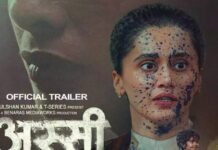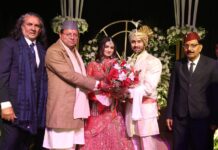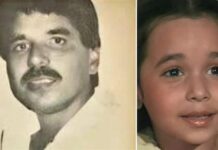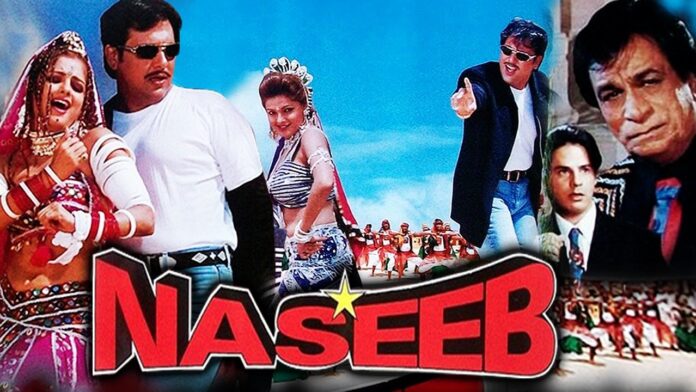NASEEB
Vinay Pictures’ Nasseb (UA) is about a man who is not able to marry the girl he loves. He hits the bottle but cannot forget his beloved who has, in the meantime, married another guy. The beloved’s husband is framed for a crime he hasn’t committed and is even jailed. It is the alcoholic who, after a lot of turns and twists in the drama, gets the husband freed from prison. But no sooner does the husband come out of jail than he starts suspecting his wife of infidelity and throws her out of his house on the assumption that she has had physical relations with her ex-lover. Finally, the alcoholic ex-lover proves to the husband that his wife is not unfaithful.
The drama is unconvincing and moves at a slow pace. Two major drawbacks of the film are that the hero (Govinda) is shown in an inebriated state (drunken) almost in the entire film, and secondly, the angle of the husband suspecting his wife looks too contrived. If the story is weak, the screenplay is hardly any better. Dialogues are good at several places, but to no avail.
Thanks to the shoddy script, even the ever-dependable Govinda fails to impress except in some light scenes in the early reels. Mamta Kulkarni is miscast and does an average job. Rahul Roy is poor. Kader Khan is good for the front-benchers. Shakti Kapoor is loud. Sudha Chandran, Saeed Jaffrey, Dinesh Hingoo, Ajit Vachani, Beena, Vikas Anand and the rest lend ordinary support.
Kirti Kumar’s direction is a shade better than the dull script but that isn’t saying much. Music is weak. Even the song picturisations are ordinary. Camerawork is okay. Action scenes are functional.
On the whole, Naseeb is a dull show.
Released on 18-12-’98 at Minerva and 11 other cinemas of Bombay by Pushpa Movies thru Nobel Films Distributors. Publicity: dull. Opening: good. …….Also released all over except in East Punjab and the Eastern circuit. Opening was good in parts of U.P. and Rajasthan but dull in C.P.C.I. 1st day Jaipur 1,07,700/- from 3 cinemas, fair, Jodhpur 59,960/-, good.
SAAWAN KUMAR’S ELECTION TO IMPPA HELD ILLEGAL
The Bombay city civil court on 15th December held Saawan Kumar’s election to the executive committee of the Indian Motion Picture Producers’ Association illegal. Sultan Ahmed had taken the matter of Saawan Kumar’s election to court, alleging that since he had not attended the required number of meetings (40%) in the previous year, he was not entitled to stand for re-election this year. All the same, Saawan Kumar did contest the elections to the executive committee in September this year, from Shakti Samanta’s group and he was elected to power.
The court’s decision makes Saawan Kumar’s election to the committee null and void. Saawan Kumar may appeal to a higher court within a month.
ARBAAZ KHAN WEDS
Actor Arbaaz Khan got married to model and actress Malaika Arora on 12th December in Bombay.
PATERNITY SUIT AGAINST TAMIL FILM ACTOR
The Kodambakkam police (Madras) earlier this week requested the Hyderabad-based Centre for DNA Fingerprinting and Diagnostics (CDFD) to perform DNA testing on samples provided by Tamil film actor Mansoor Ali Khan in connection with a paternity suit. The actor has been sued by his former employee, Sneha Sharma, who has alleged that the actor had taken her to a five-star hotel where he had sexually exploited her after giving her a drink mixed with intoxicants. She later gave birth to a male child and named him Mehboob Ali Khan after his alleged father, Mansoor Ali Khan. The actor, on his part, has denied any wrong-doing and has contested the claim of the woman. He has also promised full co-operation to the police in carrying out the DNA testing which will ascertain whether he has fathered the child or not.
Earlier, on 11th December, the actor was arrested as he and his fans were attempting to play cricket before the Raj Bhawan in Madras, ostensibly to show their support to a countrywide general strike held that day. He was later ordered to be arrested by the Madras high court in connection with the paternity suit.
3-E
Education-Entertainment-Enlightenment
Desh Mein Super-Hit, Dada Pardesh Mein Bhi Super-Hit
When it rains, it pours. Govindbhai Patel’s Gujarati film, Desh Re Joya Dada Pardesh Joya, has already done a business of 10 crore in Gujarat and Saurashtra. And there are almost 100 centres (including touring centres) where the film has not yet been released! In the meantime, it is bringing in handsome shares even where released in repeat-run. From a city like Surat alone, its share is more than 1.3 crore! From Viramgan, where Govindbhai’s earlier hit, Oonchi Medi Na Ooncha Mol had yielded a share of Rs. 25,000, DRJDPJ has fetched a share of — hold your breath — Rs. 14 lakh. For the USA, Canada and the UK, the film was sold for 36 lakh and has already crossed business of 1 crore. Reportedly, foreigners come to cinemas screening the Gujarati film in Overseas countries, alongwith their Gujarati friends who translate the dialogues in English for them while the screening is on. It is learnt, the foreigners also cry in the emotional songs in the film. Suresh Patel, the Overseas distributor (for USA-Canada-UK) is now contemplating buying rights for other parts of Overseas. D. Rama Naidu, in the meanwhile, has not only bought the Tamil and Telugu remaking rights but also remade the film in Telugu with Nagarjuna and Rambha in the lead. Mukesh Khanna and Ved Khanna had planned to buy its Rajasthani and Punjabi remaking rights but the deal could not be struck as a mutually agreeable price wasn’t finalised. So now, Govindbhai is himself remaking the film — in Rajasthani and Marathi languages.
Sharing The Credit
More often than not, stars love to hog the limelight for a success while blaming the producer or director or anybody else for the failure of their film. But Bobby Deol can be seen giving full credit for the success of his Soldier to the Taurani brothers and the director duo of Abbas-Mustan. Soldier has come like a shot in the arm for Bobby whose career was going almost nowhere, what with Gupt proving to be a partial success (hit in some circuits, commission-earner in a couple of other circuits and losing in some) and …Aur Pyar Ho Gaya and Kareeb bombing at the box-office. With the success of Soldier, Bobby is once again in the reckoning and will surely bag a handful of enviable assignments.
No ‘Shaktimaan’ Came To Their Rescue
In a bizarre incident in Hubli last week, two girls set themselves afire while trying to imitate a scene from the popular TV serial, Shaktimaan. Varsha Kulkarni and Asma Lattepanavar, both 10 years old, were at play in an open field near their houses in Sattur village near Hubli on 13th December. Both were ardent fans of Shaktimaan, the television super-hero, who appears out of thin air to rescue people in distress. In a sudden bout of fancy, both the girls decided to recreate a scene from one of the episodes of the serial, where the super-hero rescues two persons from being burnt and heals them with his magic powers. What transpired later is both, gruesome and tragic. It is reported that Asma ran into her house, brought kerosene, poured it on Varsha and set her on fire. A while later, as Varsha went up in flames, Asma repeated the act on herself. Their cries were heard by people in the vicinity, who quickly reached the spot and doused the fire. While Asma was fortunate to have escaped with minor burns, Varsha was admitted to a Hubli hospital with over 90% burns. The doctors have reportedly termed her condition as critical and fear that her chances of survival are slim.
Goes to show, how powerful the medium of television has become, especially in regard to impressionable minds.
A Fabulous Offer
Randhir and Rishi Kapoor have been offered a fabulous price of Rs. 4.5 crore for the Overseas rights of their Aa Ab Laut Chalen. And did they jump at the offer to clinch the deal? No sir! The Kapoor brothers expect and desire a still higher price. Aa ab wait karen….!
OBITUARY
KAVI PRADEEP (1915-1998)
Chal akela, chal akela, chal akela,
Tera mela peechhe chhoota
Raahi chal akela
Kavi Pradeep, the poet who penned these deeply meaningful yet simple lyrics, passed away in Bombay on December 11, 1998. He was 83. The above lyrics may have been an anachronism when looked at in the light of the fact that Pradeep had seen almost all of his contemporaries, barring Ashok Kumar and Anil Biswas, pass away one by one over the years before his unfortunate death last week.
Born Ramchandra Dwivedi on 6th February, 1915, Kavi Pradeep had already achieved popularity in the Hindi poetry circles by the time he completed his B.A. from Lucknow. He later migrated to Bombay (in 1935) and earned himself a job in Bombay Talkies as a writer and lyricist. From here began his life-long quest to achieve a permanent place for himself in the history of Indian cinema. That he was able to fulfil this quest in a short span of time speaks highly of the greatness of his lyrics and their popularity among the listeners. However, a wide section of his fans still believes that Pradeep never received due recognition for his work. Even the Dadasaheb Phalke award that he received last year came too late for him, they feel — and perhaps, rightly so. Nevertheless, the poet himself was never heard complaining and instead, went on composing one nugget after another, thereby leaving an immensely rich poetic heritage behind for the world to savour.
Having received reasonable success as a singer in Bandhan (1940) early in his film career, Pradeep went on to pen lyrics for some of the immortal songs in films like Jhoola, Kismat, Nastik, Harishchandra Taramati, Bandhan, Jagruti and Jai Santoshi Maa, among others. The first film for which he penned songs, albeit a bit reluctantly, was Kangan.
It is said that Pradeep was forced to add ‘Kavi’ before his name in the ’50s as a lot of his mail used to land up at the then superstar Pradeep Kumar’s doorstep! That aside, Pradeep’s poetic oeuvre ranged from the sentimental Upar gagan vishal (Mashal, 1950) to the nostalgic Ek karz maangta hoon / Bachpan udhaar dey do to the philosophical Dekh tere sansaar ki haalat (Nastik, 1954) to an inspiring Chal chal re naujawan. However, Kavi Pradeep will forever be remembered for the fierce nationalistic fervour expressed in Aao bachchon tumhein dikhayein jhanki Hindustan ki (Jagruti, 1954), Hum laayein hain toofan se (Jagruti), Aaj Himalay ki choti se phir humne lalkara hai and scores of other songs that remain popular till date. Much before the Indo-Pak wars broke out, Pradeep had written Kehni hai ek baat humein iss desh ke peheredaron se / Sambhal ke rehna apne ghar mein chhipe huey gaddaron se (Talaq, 1958), sounding the government of the separatist and partisan forces at play in India. Yet, his crowning achievement was to come a few years later.
Written in the aftermath of the Indo-China war as a tribute to our jawans who laid down their lives for the country, Pradeep’s Ae mere watan ke logon touchingly echoed the feelings of an entire nation grieving in the wake of their sacrifice. Its earthy lyrics, written straight from the heart, continue to strike a chord among listeners even today. History has it that the song had moved the then prime minister, Jawaharlal Nehru, to tears when it was rendered by Lata Mangeshkar under the baton of music composer C. Ramchandra at a function in Delhi, held soon after the Chinese aggression had ended. History also has it that Kavi Pradeep himself was not invited at what could have easily been the most cherishable occasion of his life. It was only when Pt. Nehru enquired of the lyricist of the song, towards the end of the function, that the organisers realised the grave injustice they had done to the poet. Eventually, Pradeep received an opportunity to recite the song in person to Pt. Nehru, on the latter’s Bombay visit afterwards. He also presented a copy of the song to a sobbing Pt. Nehru on the occasion. This, for a man vowed to a simple life, remained the greatest compensation for his work. It may be apt to remember here that Kavi Pradeep, having dedicated the song to the nation, did not accept any royalty from HMV which released it in an album. Even later, when the song became hugely popular and its royalty ran into lakhs of rupees, Pradeep steadfastly held on to his earlier decision.
Kavi Pradeep had also written a song which was recorded in the voice of Asha Bhosle and composed by C. Ramchandra in the early ’70s. The song, written as a tribute to the widows of jawans who brought India victory in wars while losing their lives, had impressed the then prime minister, Lal Bahadur Shastri, tremendously. However, for some unknown reason, the song was never presented to the public. Had it been released, the song could have scaled the same heights of popularity that Ae mere watan ke logon did, felt Pradeep. The song goes thus –
Kar lo pranaam ae logon
Vey vandaneeya hain behenein
Iss desh ke liye jinhone
Vidhwa ke kapde pehne…..
Ek din samay badal jaayega
Mulk mein aayegi khush-haali
Par sarhad pe bhatakti rahengi
Inki aankhen khaali khaali
Sab kuchh lootakar in behenon ne
Hum sab ka Kashmir bachaaya
Watan yeh zinda rahe iss liye
Apna suhaag sindoor lootaaya
Long live, Kavi Pradeep.
– Raj Vaidya
(with inputs from O.L. Sharma, chief protocol officer,
Konkan Rly. Corpn.)





























